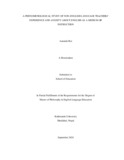
Please use this identifier to cite or link to this item:
https://hdl.handle.net/20.500.14301/451| Title: | A Phenomenological Study of Non-English Language Teachers’ Experience and Anxiety about English as a Medium of Instruction |
| Authors: | Rai, Aananda |
| Citation: | Rai,A.(2024).A phenomenological study of Non-English language teachers’ experience and anxiety about english as a medium of instruction. |
| Issue Date: | Sep-2024 |
| Publisher: | Kathmandu University School of Education |
| School: | SOED |
| Department: | DOLE |
| Level: | M.Phil. |
| Program: | Master of Philosophy (MPhil) in English Language Education |
| Abstract: | This study explores the school non-English language teachers’ experience of using English as a Medium of Instruction (EMI) and its psychophysiological consequences like anxiety. There are various reasons behind such experience, such as linguistic inadequacy and obscurity in language policy in Nepali education. I reviewed the relevant literature to achieve my goals, concentrating on themes, empirical studies, policy documents, and methodological reviews to establish my argument. Following the interpretive paradigm, I employed Interpretative Phenomenological Analysis (IPA) as a research method under phenomenological methodology. To meet the purpose of this research, I collected data from five non-English language teachers who used EMI in their pedagogical activities, through semi-structured interviews using interview guidelines and taking field notes. For data analysis, I followed the Step-by-Step analysis process recommended by Noon (2018), where four superordinate themes emerged, containing four subordinate themes for each superordinate one, representing all five of my research participants’ lived EMI experience. I followed the principles of the cognitive theory of anxiety that enabled me to interpret, conceptualize, understand, and define the phenomena studied in this research. The discussion reveals the tangled interplay between the participants’ perceptions of themselves as ‘non-language teachers’ and the profound consequences they face while using English as the language of their pedagogical instruction in a non-native context, leading them to experience EMI as an ‘extra burden.’ This study contributes to the discourse of English in Nepali education by uncovering the psychophysiological intricacies manifested in non-English language teachers due to the obligation of using English while working within the EMI framework despite their linguistic inadequacies. By proposing practical initiatives to mitigate the negative impacts of EMI on teachers, I, in this research, voice for informed policy decisions to realize non-English language teachers’ ongoing concerns on blindfolded EMI practice across academia. With expanding theoretical insights into the psychosocial dimensions of EMI experience among non-English language teachers, this study provides viable implications for educators, policymakers, and researchers in English in education for effective EMI praxis. The findings aspire to future research to explore the practitioners’ vivid EMI consequences realized in a non-native context that contributes to the discourse of prevailing EMI practice across the academic spectrum. |
| URI: | https://hdl.handle.net/20.500.14301/451 |
| Appears in Collections: | Dissertation |
Files in This Item:
| File | Description | Size | Format | |
|---|---|---|---|---|
| WCC_Dissertation_Aananda Rai1.pdf | 721.63 kB | Adobe PDF |  View/Open |
Items in DSpace are protected by copyright, with all rights reserved, unless otherwise indicated.